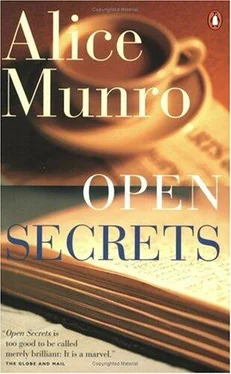We have been very happy .
I have often felt completely alone .
There is always in this life something to discover .
The days and the years have gone by in some sort of blur .
On the whole, I am satisfied .
When Lottar was leaving the Bishop’s courtyard, she was wrapped in a long cloak they had given her, perhaps to conceal her ragged clothing, or to contain her smell. The Consul’s servant spoke to her in English, telling her where they were going. She could understand him but could not reply. It was not quite dark. She could still see the pale shapes of roses and oranges in the Bishop’s garden.
The Bishop’s man was holding the gate open.
She had never seen the Bishop at all. And she had not seen the Franciscan since he had followed the Bishop’s man into the house. She called out for him now, as she was leaving. She had no name to call, so she called, “ Xoti! Xoti! Xoti ,” which means “leader” or “master” in the language of the Ghegs. But no answer came, and the Consul’s servant swung his lantern impatiently, showing her the way to go. Its light fell by accident on the Franciscan standing half concealed by a tree. It was a little orange tree he stood behind. His face, pale as the oranges were in that light, looked out of the branches, all its swarthiness drained away. It was a wan face hanging in the tree, its melancholy expression quite impersonal and undemanding, like the expression you might see on the face of a devout but proud apostle in a church window. Then it was gone, taking the breath out of her body, as she knew too late.
She called him and called him, and when the boat came into the harbor at Trieste he was waiting on the dock.
It was on a Saturday morning
Just as lovely as it could be
Seven girls and their Leader Miss Johnstone
Went camping from the C.G.I.T .
“And they almost didn’t even go,” Frances said. “Because of the downpour Saturday morning. They were waiting half an hour in the United Church basement and she says, Oh, it’ll stop — my hikes are never rained out! And now I bet she wishes it had’ve been. Then it would’ve been a whole other story.”
It did stop raining, they did go, and it got so hot partway out that Miss Johnstone let them stop at a farmhouse, and the woman brought out Coca-Colas and the man let them take the garden hose and spray themselves cool. They were grabbing the hose from each other and doing tricks, and Frances said that Mary Kaye said Heather Bell had been the worst one, the boldest, getting hold of the hose and shooting water on the rest of them in all the bad places.
“They will try to make out she was some poor innocent, but the facts are dead different,” Frances said. “It could have been all an arrangement, that she arranged to meet somebody. I mean some man.”
Maureen said, “I think that’s pretty farfetched.”
“Well, I don’t believe she drowned,” Frances said. “That I don’t believe.”
The Falls on the Peregrine River were nothing like the waterfalls you see pictures of. They were just water falling over limestone shelves, none of them more than six or seven feet high. There was a breathing spot where you could stand behind the hard-falling curtain of water, and all around in the limestone there were pools, smooth-rimmed and not much bigger than bathtubs, where the water lay trapped and warm. You would have to be very determined to drown in there. But they had looked there — the other girls had run around calling Heather’s name and peering into all the pools, and they had even stuck their heads into the dry space behind the curtain of noisy water. They had skipped around on the bare rock and yelled and got themselves soaked, finally, plunging in and out through the curtain. Till Miss Johnstone shouted and made them come back.
There was Betsy and Eva Trowell
And Lucille Chambers as well
There was Ginny Bos and Mary Kaye Trevelyan
And Robin Sands and poor Heather Bell .
“Seven was all she could get,” Frances said. “And every one of them, there was a reason. Robin Sands, doctor’s daughter. Lucille Chambers, minister’s daughter. They can’t get out of it. The Trowells — country. Glad to get in on anything. Ginny Bos, the double-jointed monkey — she’s along for the swimming and the horsing around. Mary Kaye living next door to Miss Johnstone. Enough said. And Heather Bell new in town. And her mother away on the weekend herself — yes, she was taking the opportunity. Getting off on an expedition of her own.”
It was about twenty-four hours since Heather Bell had disappeared, on the annual hike of the C.G.I.T. — which stood for Canadian Girls in Training — out to the Falls on the Peregrine River. Mary Johnstone, who was now in her early sixties, had been leading this hike for years, since before the war. There used to be at least a couple of dozen girls heading out the County Road on a Saturday morning in June. They would all be wearing navy-blue shorts and white blouses and red kerchiefs round their necks. Maureen had been one of them, twenty or so years ago.
Miss Johnstone always started them off singing the same thing.
For the Beauty of the Earth ,
For the Beauty of the Skies ,
For the Love that from our Birth
Over and around us lies—
And you could hear a hum of different words going along, cautiously but determinedly, under the hymn words.
For the sight of Miss Johnstone’s bum ,
Waddling down the County Road .
We are the morons singing this song—
Doesn’t she look just like a toad?
Did anybody else Maureen’s age remember these words now? The ones who had stayed in town were mothers — they had girls old enough to go on the hike, and older. They would get into the proper motherly kind of fit about rude language. Having children changed you. It gave you the necessary stake in being grown-up, so that certain parts of you — old parts — could be altogether eliminated and abandoned. Jobs, marriage didn’t quite do it — just made you act as if you’d forgotten things.
Maureen had no children.
Maureen was sitting with Frances Wall, having coffee and cigarettes at the breakfast table that had been wedged into the old pantry, under the high, glass-fronted cupboards. This was Maureen’s house in Carstairs, in 1965. She had been living in the house for eight years, but she still felt as if she got around it on fairly narrow tracks, from one spot where she felt at home to another. She had fixed up this corner so there was a place to eat other than the dining-room table, and she had put new chintz in the sunroom. It took a long time to work her husband around to changes. The front rooms were full of valuable, heavy furniture, made of oak and walnut, and the curtains were of green-and-mulberry brocade, as in a rich-looking hotel — you could not begin to alter anything there.
Frances worked for Maureen in the house, but she was not like a servant. They were cousins, though Frances was nearly a generation older. She had worked in this house long before Maureen came into it — she had worked for the first wife. Sometimes she called Maureen “Missus.” It was a joke, half friendly and half not. How much did you give for those chops, Missus? Oh, they must have seen you coming! And she would tell Maureen she was getting broad in the beam and her hair did not suit her piled and sprayed like an upside-down mixing bowl. This though Frances herself was a dumpling sort of woman with gray hair like brambles all over her head, and a plain, impudent face. Maureen did not think of herself as timid — she had a stately look — and she was certainly not incompetent, having run her husband’s law office before she “graduated” (as both she and he would say) to running his house. She sometimes thought she should try for more respect from Frances — but she needed somebody around the house to have spats and jokes with. She could not be a gossip, because of her husband’s position, and she didn’t think it was her nature, anyway, but she let Frances get away with plenty of mean remarks, and wild, uncharitable, confident speculations.
Читать дальше












